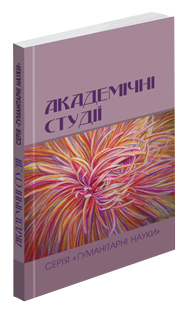Abstract
This article presents the first comprehensive scholarly analysis of Olena Zvychayna’s novella “The Golden Stream from Starving Kharkiv” (1947), a work that has long remained outside the scope of literary scholarship and has not been the subject of dedicated academic inquiry. The text has yet to receive due recognition within the academic community. Olena Zvychayna’s oeuvre belongs to a largely underexplored segment of Ukrainian literature shaped by the context of forced emigration. Her literary legacy merits special attention not only for its artistic sophistication but also for the relevance of its themes – most notably, the experiences of occupation, survival, and the moral resistance of the Ukrainian intelligentsia. At the heart of the novella is the character of Katrusia, a young intellectual from Kharkiv who is compelled to endure humiliation, starvation, moral blackmail, and the loss of loved ones. Under the pressure of external circumstances, her inner world gradually transforms, yet the protagonist retains the ability to critically reflect on her experiences. With profound psychological insight, the work portrays the lives of Kharkiv residents under German occupation during 1941– 1942. Special attention is devoted to the socio-psychological representation of the female figure – as mother, beloved, and intellectual – who must navigate the harrowing choice between physical survival and the preservation of moral dignity in wartime conditions. Zvychayna demonstrates how, under extreme starvation and moral collapse, ethical foundations begin to erode: intellectuals degenerate, and young women are often forced into prostitution as the only means of survival. Against this backdrop, Katrusia emerges as a powerful figure – a woman who, despite suffering, strives to preserve not only her own and her child’s physical existence but also their spiritual integrity. The article underscores the importance of incorporating this novella into scholarly and cultural-educational discourse as a valuable source for the literary interpretation of wartime experience. It also highlights the need for broader study of Olena Zvychayna’s émigré works, which not only preserve the memory of the tragic events of the twentieth century but also shape a literary image of female resilience, dignity, and national self-preservation.
References
Кривчун В. Межі свободи: голос письменниці-емігрантки Олени Звичайної (на матеріалі повісті «Ти»). Меморіалізація: від наукових засад до світових практик: матеріали міжнародної науково-практичної конференції (Київ, 22 листопада 2024 р.). Київ, 2024. С. 158‒160.
Кривчун В. Фольклорний образ плахти та її символічне значення у нарисі Олени Звичайної «Миргородський ярмарок». Академічні студії. Серія «Гуманітарні науки». 2024. Вип. 1. С. 18‒25.
Ленська С. Антитоталітарний дискурс у малій прозі Олени Звичайної. Вісник Маріупольського державного університету. Серія : Філологія. 2015. Вип. 13. С. 37–45.
Олена Звичайна. Золотий потічок з голодного Харкова. Повість з часів німецької окупації України. Накладом Організації Українок Канади. Вінніпег : Манітоба, 1947. 96 с.

This work is licensed under a Creative Commons Attribution 4.0 International License.

